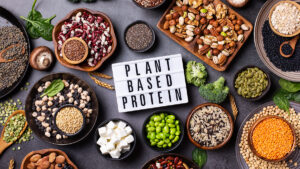Diets/Dieting/Fad Diets
Evening Training Improves Glucose Metabolism
Recent research shows time of day makes a difference for cardiometabolic benefits. For those coping with type 2 diabetes, training at the end of the day improves glucose metabolism, according…
Food as Medicine: Meals for Mental Health
Ever eat your feelings? Or feel low after a few too many nutrition-poor meals? A newer area of practice called nutritional psychology looks at this intersection of nutrition and mental…
Why yo-yo dieting is the toxic diet culture we need to be worried about
Maintaining a healthy weight is important. But yo-yo dieting has detrimental effects and is not the answer.
Even just 1 alcoholic drink per day may increase blood pressure
One drink per day has been touted as fine. But even one drink per day can have negative health consequences.
What do you think? Should every one be eating a plant based diet?
More beans, less beef? Yes! A plant based diet is good for you AND the environment. Check out how to make the swap!
Buy or Bye: Greens Powders
Are greens powders and similar supplements worth the hype? Or are real fruits and veggies the better choice?
Food Insecurity Linked to Shorter Life, Early Death
Stress from not enough food, or food insecurity, can have detrimental health effects and even result in a lower life expectancy.
Gut Microbiome Composition Tied to Athletic Performance
Gut microbiome health is everywhere and for good reason! It can even have an impact on your physical or athletic performance.
Eating more nitrate-rich veggies can improve brain health
What’s a nitrate and why do you need it? Eating more nitrate-rich veggies can improve brain health. Find out which vegetables are best.
Want a healthier diet that still tastes great? Go bigger on spices and herbs.
Grab those herbs and spices! Research shows it’s possible to maintain flavor without the excess of saturated fat, sugar and salt.
Exercise won’t silence the health problems of sugary drinks
Sugary drinks may taste great but the long term health affects aren’t. Can exercise cancel out the negative aspects of sugary drinks?
Decoding and Dismissing Diet Culture: A Call to Action
What is a “diet culture” and why is it so bad for us? Read how to combat the toxic diet culture in our society.
Understanding Obesity Medications and the Role of Exercise
Obesity medications are a hot topic. But how does exercise play into their use and their effectiveness? Read on to find out!
Secrets of Super Agers
What’s their secret? Why do Super Agers, people who live past 90, have such long lives? What can you do to live a longer, healthier life?
Counting Calories or Intermittent Fasting for Losing Weight
Does calorie counting or intermittent fasting do a better job at helping people drop pounds? This study investigates.
Family Meals Improve Diet Quality
On average, more drawn-out family meals induced kids to eat 3.32 more pieces of fruits and 3.66 more pieces of vegetables.
Statistics Confuse Nutrition Studies
According to a report, the discrepancies in findings in nutrition studies may come down to the use of statistics.
Reducing Dietary Salt Consumption
A WHO report emphasizes the need for reducing dietary salt consumption to save the lives of about 7 million people worldwide.
Diets That Support Longevity
We might be able to reduce our risk of premature death by eating these four healthy diets that support longevity, according to a study.
5 Affordable Plant-Based Proteins to Meal Prep
Here’s how to help educate your clients on plant-based proteins and get creative with them in the kitchen.



















